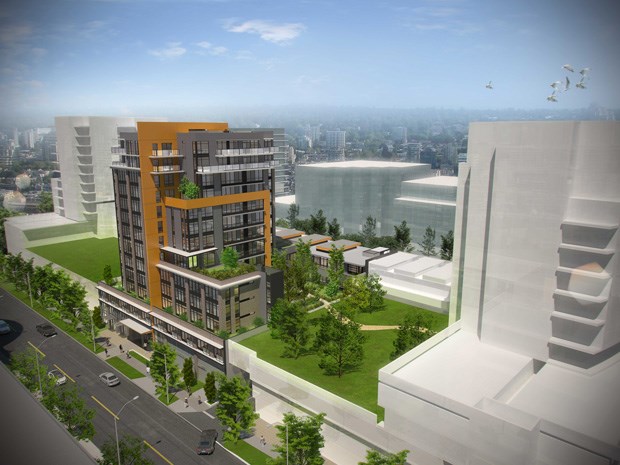City councillors and Mayor Malcolm Brodie have chosen to dip into excess casino revenues to temporarily fund rent subsidies at a planned social housing complex on Granville Avenue, thus saving 29 affordable housing units near the Richmond Olympic Oval.
The planned 129-unit tower, which will also house a number of non-profit social agencies, was officially named Storeys by the City of Richmond in a news release Thursday, after colloquially being dubbed the “KFC site” within City Hall for some years (Storeys will be built on the former site of a Kentucky Fried Chicken restaurant).
Storeys is said to allude to the distinct, diverse backgrounds of the residents who will live there, all of whom will be in need of subsidized rent.
Brodie said Storeys needed a $3 million injection of cash to help finalize subsidized rental pricing for the future tenants while still maintaining the same building expectations.
In June, staff had proposed to nix the 29 units from the Oval Village development by Intracorp at 6888 River Rd. and 6900 Pearson Way for $4.5 million of cash-in-lieu. Then, Brodie had wanted a compromise of asking for $3 million, while retaining some of the units. The report was sent back and reappeared this week at a planning committee meeting on Tuesday recommending $3 million and seven affordable housing units.
But Coun. Evelina Halsey-Brandt floated the idea of using casino funds to save all the units.
“The more I thought about it the more I liked the idea,” said Brodie.
De Whalen, of the Richmond Poverty Response Committee, applauded the decision to keep the 29 units in place.
“I think that’s an excellent idea. Our view all along is we need complete communities. It makes for a more vibrant community than having just a rich area,” said Whalen, who has voiced prior concerns about exclusivity building up near the Oval, especially after the massive River Green project was able to skirt the city’s affordable housing strategy for a cash payment.
The plan was adopted unanimously and is expected to pass through city council on Monday.
Brodie said the extra $3 million should eventually be paid back to the city through fundraising from Storeys’ tenants (social agencies) as well as its residential tenants.
Since 1999, the City of Richmond has received $141 million in casino revenues (10 per cent of the net revenue of the River Rock Casino and Resort).
“There are things we’re using the money from the casino for. They’re one-time items, so we’re not operationally dependent on it,” said Halsey-Brandt.
“If we didn’t, we would have to raise the money through taxes,” she added.
After paying off a $50 million loan for the Olympic Oval this year, the city will then commit $5 million of casino funds per year over the next 10 years to paying off the new Minoru Recreation Complex.
Storeys is expected to be completed in the spring of 2016. It will house Atira Women’s Resource Society, Coast Mental Health, Canadian Mental Health Association’s Pathways Clubhouse, S.U.C.C.E.S.S., Tikva Housing Society and Turning Point Housing Society. Together, they will form a consortium that will manage the complex, housing some of the most vulnerable residents of the city.
Note: This story was edited to correct the fact that the $3 million was not an "overrun" as previously reported. See subsequent story below, dated Aug. 1:
On Monday, Richmond City Council officially passed a $3 million loan, using casino revenue, for rental subsidies at a planned 129-unit social housing complex.
The News previously reported the funding for the City Centre site was a cost overrun. However, Mayor Malcolm Brodie noted thereafter that the loan was planned. City staff initially asked developer Intracorp for cash, in lieu of building 29 affordable housing units, to fund the loan.
Many of the details of the project have remained private due to inter-governmental and inter-agency negotiations, said Brodie, who noted Monday the city has contributed $16.8 million from its housing reserve and developer contributions and about $7 million worth of land, which is expected to be leased at a "nominal" rate.
Last year, the city stated it had approved a "financial contribution" of $19.8 million for the project.



